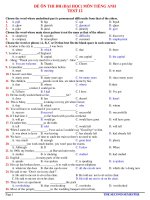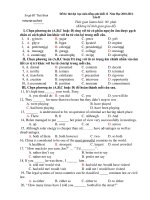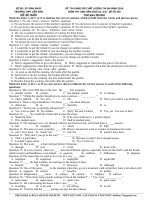Đề thi thử đại học môn tiếng anh - đề 12
Bạn đang xem bản rút gọn của tài liệu. Xem và tải ngay bản đầy đủ của tài liệu tại đây (88.08 KB, 9 trang )
Read the texts and decide which word A, B, C or D best fits each space
TEST 1
The ability to weep is a uniquely human form of emotional response. Some scientists have
suggested that human tears are evidence of an aquatic past- but this does not seem very likely.
We cry from the moment we enter this (1) ……. for a number of reasons. Helpless babies cry
to (2) ……. their parents that they are ill, hungry or uncomfortable. As they (3) …….., they
will also cry just to attract parental attention and will often stop when they get it.
The idea that having a good cry can do you (4) ……. is a very old one and now it has scientific
validity since recent research into tears has shown that they contain a natural painkiller called
enkaphalin. By (5) …….. sorrow and pain, this chemical helps you to feel better. Weeping can
increase the quantities of enkaphalin you (6) ……….
Unfortunately, in our society we impose restrictions (7) …….. this naturally healing activity.
Because some people still regard it as a (8) ……… of weakness in men, boys in particular are
admonished when they cry. This kind of repression can only increase stress, both emotionally
and physically.
Tears of emotion also help the body (9) ……… itself of toxic chemical waste, for there is
more protein in them than in tears resulting (10) …….. cold winds or other irritants. Crying
comforts, calms people and can be very enjoyable- consider the popularity of the highly
emotional films which are commonly called weepies. It seems that people enjoy crying
together almost as much as laughing together.
1. A. world B. place C. earth D. space
2. A. inform B. communicate C. persuade D. demonstrate
3. A. evolve B. develop C. alter D. change
4. A. good B. fine C. better D. well
5. A. struggling B. fighting C. opposing D. striking
6. A. construct B. achieve C. provide D. produce
7. A. for B. to C. about D. upon
8. A. hint B. feature C. sign D. symbol
9. A. expel B. escape C. release D. rid
10. A. in B. from C. by D. to
TEST 2
In the US, industries that generate hazardous wastes want to dispose of them as cheaply
as possible. Private companies hired to dispose of this waste compete with each other to
offer the lowest prices to these industries. The government does not get involved, beyond
setting minimum safety standards.
Unfortunately, the (1) …….. of companies that generate and dispose of waste is to save
money, (2) …..… to guarantee safety. These companies usually send waste to landfills
because this is cheaper than recycling or incineration. Disposal firms who want to increase
their business must cut corners to lower costs and (3) …..…. customers. At the same time,
relatively (4) ….…. is done to reduce the volume of waste generated, because disposal cost
(5) …..…. relatively modest.
Things are different in Denmark. There the government (6) ….….. in the waste disposal
process beginning (7) …….... the front end. Together with industry, the government
formed a corporation to establish and (8) …..…. waste disposal facilities. This company,
called Kommunichem, has a (9) ……….. on waste disposal. Generators of hazardous waste
(10) ……... ship their waste to one of Kommunichem’s disposal facilities. In this system,
there is no price competition in the waste disposal business.
1. A. solution B. license C. importance D. goal
2. A. not B. just C. besides D. something
3. A. survive B. efficient C. gain D. prosper
4. A. more B. this C. recycling D. little
5. A. still B. have C. remain D. cheap
6. A. interferes B. participates C. involves D. controls
7. A. to B. by C. of D. at
8. A. operate B. found C. prepare D. generate
9. A. power B. responsibility C. monopoly D. profit
10. A. help B. disposal C. take D. must
TEST 3
Some people believe that soon schools will no longer be necessary. They say that (1)
…….the Internet and other new technologies, (2)……no longer any need for school
buildings, formal classes, or teachers. Perhaps this will be true one day, but this is hard to
(3)…….a world without schools. In fact, we need to look at how we can use new
technology to make schools better, not (4)…….them. We should invent a new kind of
school that is (5)…...to libraries, museums, science centers, laboratories, and even
companies. (6)……could give talks on video or over the Internet. TV networks and local
stations could develop programming about things students are (7)……..studying in school.
Already there are several towns (8)…... this is beginning to happen. Blacksburg,
Virginia, is one of them. Here the entire city is linked to the Internet, and learning can (9)
…….at home, at school and in the office. Businesses provide programs for the schools and
the schools provide computer labs for people without their own (10)…..…at home.
1. a. despite b. because of c. though d. because
2. a. there are b. they are c. it is d. there is
3. a. know b. realize c. imagine d. consider
4. a. to eliminate b. eliminative c. eliminator d. elimination
5. a. limited b. linked c. contributed d. addressed
6. a. Policemen b. Experts c. Orators d. Businessmen
7. a. actually b. rarely c. intentionally d. publicly
8. a. which b. where c. that d. Ø
9. a. take time b. take part in c. take place d. take in
10. a. jobs b. equipment c. documents d. computers
TEST 4
When you read something in a foreign language, you frequently come across words you
do not (1) ……. understand. Sometimes you (2) ……. the meaning in a dictionary and
sometimes you guess. The strategy you adopt depends very much upon the (3) ……… of
accuracy you require and the time at your disposal.
If you are the sort of person who tends to turn to the dictionary frequently, it is (4) …….
remembering that every dictionary has its limitations. Each definition is only an
approximation and one builds up an accurate picture of the meaning of a word only after
meeting it in a (5) ……. of contexts. It is also important to recognize the special dangers of
dictionaries that translate from English into your native language and vice versa. If you
must use a dictionary, it is usually far safer to (6) ….... an English-English dictionary.
In most exams you are not permitted to use a dictionary. (7) …… you are allowed to use
one, it is very time-consuming to look up words, and time in exams is usually limited. You
are, (8) …… , forced to guess the meaning of unfamiliar words.
When you come across unknown words in an exam text, it is very easy to panic.
However, if you develop efficient techniques for guessing the meaning, you will (9) ….. a
number of possible problems and help yourself to understand far more of the text than you
at first thought likely.
Two strategies which may help you guess the meaning of a word are: using contextual
clues, both within the sentence and outside, and making use of clues (10) …….. from the
formation of the word.
1. A. fully B. wholly C. completely D. totally
2. A. control B. check C. examine D. inspect
3. A. extent B. degree C. range D. level
4. A. valuable B. essential C. worth D. vital
5. A. multiple B. diversity C. variation D. variety
6. A. survey B. consult C. refer D. inquire
7. A. In case B. Provided C. Although D. Even if
8. A. so B. therefore C. however D. so that
9. A. surpass B. get over C. go over D. overcome
10. A. derived B. extracted C. coming D. originated
TEST 5
Why did you decide to read this, and will you keep reading to the end? Do you expect to
understand every single part of it and will you remember anything about it in a fortnight’s
(1) ……? Common sense (2) ……. that the answers to these questions depend on “read
ability” - whether the (3) …..… matter is interesting, the arguments clear and the (4) ….….
attractive. But psychologists are discovering that to determine why people read – and often
don’t read – technical information, they have to (5) …..…. not so much the writing as the
reader.
Even the most technically confident people often ignore instructions for the video or
home computer in favours of hand – on experience. And people frequently (6) …..… little
notice of consumer information, whether on nitritional labels or in small print of contracts.
Psychologists researching reading tend to assume that both beginners and (7) …..…
readers read everything put in front of them from start to finish. There are arguments
among them about the (8) …....… of eyes, memory and brain during the process. Some
believe that fluent readers take (9) ……. every letter or word they see; others insist that
readers rely on memory or context to carry them from one phrase to another. But they have
always assumed that the reading process is the same: reading starts; comprehension (10)
…….. then reading stops.
1. A. term B. period C. gap D. time
2. A. suggests B. transmits C. advises D. informs
3. A. subject B. topic C. content D. text
4. A. pattern B. formation C. layout D. assembly
5. A. examine B. inquire C. trace D. calculate
6. A. get B. pay C. make D. take
7. A. competent B. sufficient C. considerable D. valid
8. A. concern B. role C. share D. relation
9. A. out B. over C. up D. in
10. A. issues B. occurs C. sets D. establishes
TEST 6
The wind controls our planet’s weather and climate, but how much do we understand
about this complex force, which can kill and spread fear?
On the night of 15 October 1987, the south of England was struck by the (1) ………
winds known for over 200 years. (2) …….. of over 130 km/h blew through the region. 19
people were killed, 1.5 billion pounds - worth of (3) ……… was caused and 19 million
trees were (4) …….. in just a few hours.
Although people thought of this as a hurricane, the winds of 1987 were only (5) ………
storm force. They are far better known than the much more serious storms of 25 January
1990, when most Britain was hit by daytime winds of up to 173 km/h. On this (6) ……, 47
people were killed, even though, unlike in 1987, the weather forecasters issued accurate (7)
………
(8) …….. weather events such as these are dramatic reminders of the power of the wind.
It is one part of the weather that people generally do not (9) ……… a second thought to,
but across the world the wind (10) …….. a crucial role in people’s lives.
1. A. heaviest B. fastest C. strongest D. quickest
2. A. Blows B. Hits C. Clouds D. Gusts
3. A. hurt B. injury C. destruction D. damage
4. A. blown down B. cut down C. knocked down D. blown up
5. A. powerful B. severe C. serious D. dangerous
6. A. occasion B. event C. accident D. incident
7. A. threats B. warnings C. news D. signs
8. A. Extreme B. Excessive C. Extravagant D. Exaggerate
9. A. have B. make C. put D. give
10. A. has B.makes C. plays D. does
TEST 7
It is now extremely popular to take a gap year between school and university or
university and work and to spend it travelling. There are plenty of reasons to recommend it
– travel (1) ……. the mind, you are only young once, life is not a rehearsal and so on. And
if you do not do it, you may always regret that you did not take the (2) …….. in the end,
there is only one response: well, why not?
The idea may have its (3) …….. in the 18
th
– century Grand Tour once undertaken by
young, rich and noble, but it is the middle classes who have turned it (4) ……….
something that 200.000 British youngsters do every year. (5) ……… has never been so
easy and cheap, with more places open to tourists than ever. Also, the gap years is now (6)
…….. by many employers and universities.
The State, the Far East and Australia were among the original (7) …….. and although
these remain in the top five, young explorers are now going even further. The most far –
flung corners of the world are (8) ……… in popularity year by year. About 700 will buy
student ticket (9) …….. for six months that will take you from London to Calcutta,
Singpore, Bangkok, Perth, Sydney, Auckland, Fiji, Tahiti, Los Angeles and (10) …….
Again.
1. A. thickens B. widens C. broadens D. stiffens
2. A. chance B. occasion C. moment D. luck
3. A. branches B. roots C. truck D. stem
4. A. out B. up C. by D. into
5. A. Excursion B. Tour C. Travel D. Voyage
6. A. admitted B. accepted C. received D. stood
7. A. destinations B. endings C. landings D. terminals









